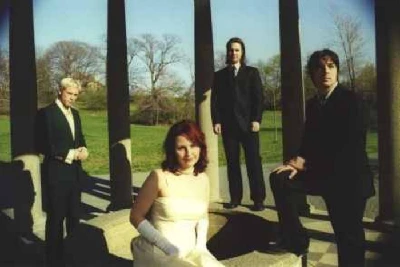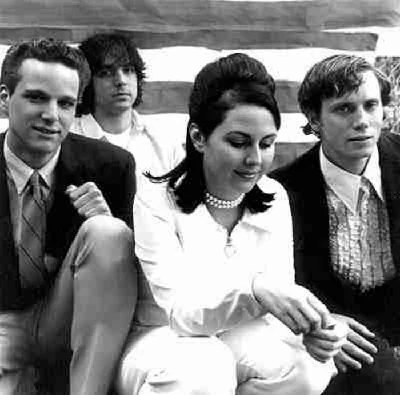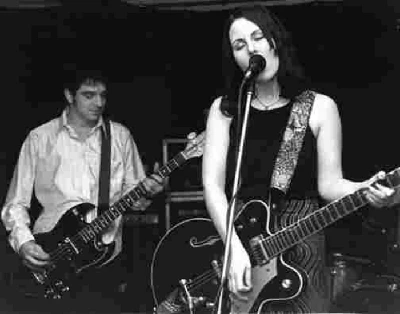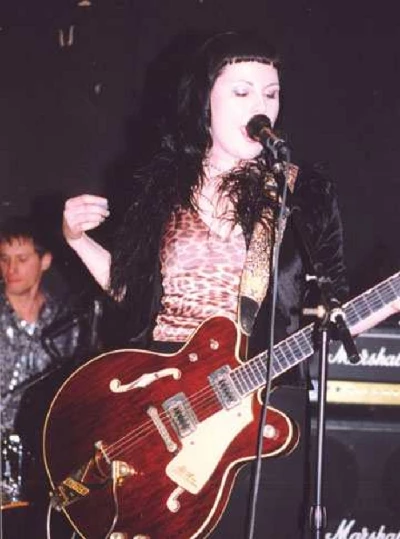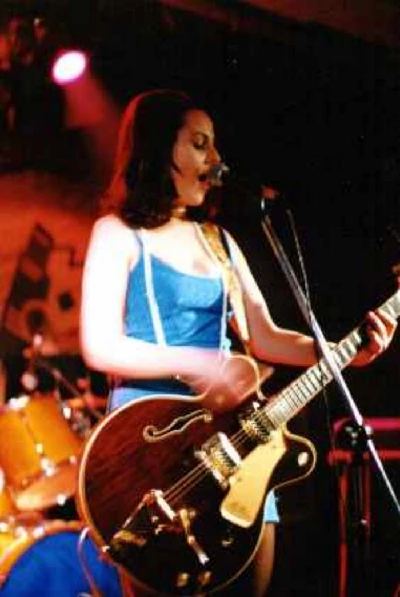published: 13 /
1 /
2002
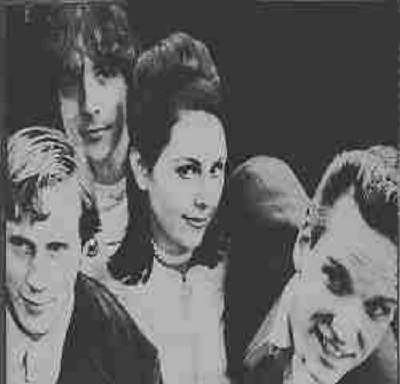
'Boy Wonder' was first formed in early 1996 in Boston by its frontwoman and principal songwriter, Paula Kelley, who was previously in 'The Drop Nineteens' and 'Hot Rod'. The band's music merges ninet
Article
'Boy Wonder' was first formed in early 1996 in Boston by its frontwoman and principal songwriter, Paula Kelley, who was previously in 'The Drop Nineteens' and 'Hot Rod'. The band's music merges nineties sounds with classic sixties pop, and combines together neatly in catchy tunes snappy, strident guitarwork ; sharp, honest vocals and carefully structured 'Beach Boys' and 'Beatles'-style arrangements and vocal harmonies.
The band have now had two official releases, 'Wonder Wear', an album which came out on Cherrydisc in September 1997, and 'Break the Spell etc', a five track EP, which was released in February of this year on Jackass Records.
Boy Wonder has been through several line-ups, but has now reached what is seen by its critics and perhaps more importantly by the band itself as its most definitive form. As well as Kelley, its other members are long term drummer, Bruce Caporal, who has been with the group since the beginning, and its two newest recruits, bassist and occasional pianist, Josh Arakelian, and guitarist, Aaron Tap. Arakelian originally joined the band as a guitarist in December 1997, when Jake Zavracky, the band's previous guitar player, quit the group. He, however, switched a few months later in July 1998 to bass, an instrument he prefers playing, when Paul Natale, the group's bassist of the time, also left to form a new band 'The Den Mothers'. Tap , who had been both a long-time fan and friend of 'Boy Wonder', and who also runs Jackass,joined the group at the same time.
In an interview with Pennyblackmusic, the group's first British one, Paula Kelley has nothing but praise for the group's two new members, both of whom have augmented and consilidated the group's sound.
"The band's been together a few years, but the line-up we have now is actually the first group of people where I feel we're on the same team." she enthuses "Aaron and Josh are both great singers, and a grandiose vocal arrangements dream. They have been able to give a free rein to the group."
"Josh has the most in common with me as far as our musical tastes go. He'sa big stickler for vocal harmonies and with his bass playing, I know that if I present a song to him in skeletal form, I won't have to explain too much to him, because he'll get it right away."
"Aaron's one of the best singers I know. He's wonderful too at guitar sounds, and textures."
'Break the Spell etc', the band's first release in its new format, is certainly impressive. Acclaimed by the critics with such reviews as 'a milestone in the band's timeline' ('The Noise'),and 'Paula Kelley's purest excursion into classic pop' ('Boston Phoenix')' , it has, although running only just fifteen minutes , a depth and style that manages to exceed many albums. All five tracks mix together the old and the new, the nostalgic and the contemporary, but with such a sense of versatility that each song is a development and expansion from the last, and opens out another layer and side to the band's sound and character.
The lively opening title track, 'Break the Spell', which was recorded when Natale was still in the band and just before Tap joined the group, has a soaring vocal from Kelley, effusive guitarwork, and a Brian Wilson type vocal arrangement. It was a song that was written by Kelley quickly in a burst of inspiration. "It just came out of nowhere, and travelled though me" she quips. In a neat catch, however, and in contrast with the exuberant tune and the seeming confident nature of the whole EP, the song is in fact about self-doubt, of which Kelley is candid enough to admit she has lots, and has her hitting back at her detractors and critics. "Many people have plenty of catty things to say about me, but if they knew how much I already beat myself up, they could really save themselves the effort."
'Over Your Head', another track, is a gorgeous 'Bee Gees' style ballad,and, with a lavish three part vocal harmony featuring Arakalein and Tap as well as Kelley, it is reminiscent of the Gibb brothers early pre-disco songs of the late sixties and first few years of the seventies.
"It wasn't conscious that it was written in a Bee Gees style" Kelley says "The Bee Gees have, however, been my longest standing influence. I've loved them since I was a kid. I've gone through many stages with them. I renounced them in high school because none of my friends thought they were cool, and I was really embarrassed that I liked them, but I ended up overcoming that a few years ago, and just admitting my love for them."
'X-Large', the penultimate track, is a fast paced punkish duet, backed with fifties harmonies, and the first dual composition of the group, it was written by both Kelley and Tap.
" I tend to be quite lazy about writing lyrics." Kelley explains describing its creation. "I always write the music first, and almost always have the harmonies and arrangements written out before I even tackle the lyrics. Aaron is the opposite. He was a poetry major, and he's always just writing down little bits of things in notebooks. I showed him the song, and said if you ever have a chance and should like to write any words it would really help me a lot, and the next day he just came in with a complete set of words. It was great." The pair have recently finished another song in the same manner, and plan to write other songs together soon.
The last track 'Elenore' is another first, the band's first ever cover recording and, featuring Arakalein on vocals, it is a faithful up-dating of the 1968 Turtles hit. It was perhaps almost inevitable that the band should record this tune. "It's funny because even before Aaron joined Boy Wonder, we were just talking one night, and realised that we both wanted to cover the song independently of each other . And Josh is a huge sixties pop fan. He's a big Turtles fan, so all three of us wanted to record it".
Paula Kelley first became interested in music at an early age " I started playing piano when I was small, and I would orchestrate these really ridiculous theatre productions in my family's living room, and I used to get my poor friends to run around and to do these horrible choreographic moves." She is, like Arakelian, a multi-instrumentalist, and played harpischord in orchestra in high school, and also taught herself to play guitar. She has more recently learnt to play the bass and the drums.
She joined her first band at Boston University, where she studied History. "They were called 'Crab Daddy'. They had the name before I was in the band. It was my first day in college. I could barely play the guitar, but for some reason they just took me into their wings. It was cool. It was the first time I was able to really write songs and to play them live."
Crab Daddy, however, had little musical direction. "All four members of the band were songwriters, and all of our influences were quite different, and not really in a good way. We didn't ever come upon cohesion in our music. My songs were jangly pop for the most part. The other guitar player was into the Beatles, the bass player was into funk, and the drummer was reggae influenced-complete with a timbale as part of his regular set-up."
While initially remaining a member of Crab Daddy, Kelley, looking for a band with more structure, also joined her second group, another Boston University act, The Drop Nineteens. It was with The Drop Nineteens that she would record her first album, and first emerge into the public eye.
The melancholic Drop Nineteens were part of the early nineties 'shoegazer' movement and their music, a mix of chiming, layered guitar sounds and distortion effects, was to prove popular in Britain and Europe, where other similar acts such as 'My Bloody Valentine', 'Lush', 'Chapterhouse' and 'The Cranes' were also a success. Their first album 'Delaware', upon which Kelley played guitar and provided some of the vocals, was released by Caroline/Hut in June 1992.
" Eventually the fact that Drop Nineteens had a record contract and were able to go on tour swayed me to quit my first band. They didn't do as well in America as they did in Britain in terms of the ratio. We might have sold more albums in America, but it's a bigger country, and I definitely remember touring around Britain we were so much more well received there, and in Europe than here. A lot of people over here wanted to hate The Drop Nineteens, because we did relatively well without really having any sort offoundation. All those dodgy rockers thought we hadn't paid our dues."
While Kelley seized at the chance to record and to tour, her time with The Drop Nineteens was musically unfulfilling and in many ways unhappy. The evolving tensions of the group would eventually force her to take the drastic step of quitting the band mid-tour in 1993 .
" I was with them on and off for about two years. It actually took some cajoling on their part to get me to join the band, because I was loathe to leave a band where I was able to write songs and to have some degree of creative control. I wasn't really involved though too much in the songwriting of The Drop Nineteens. Just a little bit ! I also didn't get along with one member in particular, and I knew that it was going to be a fiasco or that would be the eventuality if I joined, but I love performing and I love travelling, so I just decided to do it for a while."
"While we were on tour in Europe, I just really couldn't deal with it anymore. It was a really silly thing of me to quit the band while I was on tour, but there was another tour lined up in the States for when we got back, and I just told them there was no way in Hell that I was going to do that tour. It just lead to increased hostility for the rest of the trip. It was my own fault.The things that you learn !"
Kelley's next band, Hot Rod, was her first as a frontwoman. Its line-up for recording purposes also consisted of Eric Paull on drums, guitarist John Dragonetti who now plays with 'Jack Drag' and English bassist Mat Flint. Flint had toured with The Drop Nineteens in his own band 'Revolver' and was also Kelley's boyfriend at the time.
The band's only album 'Speed Danger Death' was released again on Caroline/Hut and came out a just over a year after 'Delaware' in September 1993, the same month as The Drop Nineteens second album 'National Coma'. It is probably Kelley's least known record, and certainly her most under-rated one. The ten songs on 'Speed Danger Death' on which Kelley was the sole songwriter maintain with a slightly harder and grungier form the wall of sound guitars and the distortion effects of 'Delaware', but on display for the first time and equally evident are the careful and meticulous arrangements and frank lyrics that embody her later material. A natural expansion of her work with The Drop Nineteens , 'Speed Danger Death' also indicates what was still yet to come. It, however, was given an American release only and with Kelley having problems getting a band together for touring purposes, attracted little publicity and sold badly.
"The album never got a chance." she says about it now "Hot Rod maybe played four or five live shows ever."
Kelley, hoping to build on the Drop Nineteens' popularity in Britain and that 'Speed Danger Death' might attract more of a following there, moved to London in 1994 to try to persuade Virgin/Hut, Caroline's British branch, to release the record. She was, however, to be unsuccessful.
"I went over to that damn Virgin/Hut office about ten times talking to them. They told me if I got a band together and started playing shows and got some sort of foundations there, a sort of base, maybe they would do it."She found a drummer, and Flint remained in the band in a nominal role. Her relationship, however, with the English bassist was starting to break up. The only employment available was as a badly paid waitress " where I was being trod upon at a crappy job at Cafe Pasta", and she was unable to get a work permit to get a better job. Hut also, as it transpired, despite its vague assurances, had little real interest in putting out the record. After sticking it out for six months, Kelley, depressed and "miserable", flew home.
"If Hut had been more excited about my endeavor it would have been incentive to stay. But as that seemed to be getting nowhere I couldn't see how I could have been more productive in London than at home where I could get my degree, make a viable living, and make music in a more comfortable situation." It was the the end of Hot Rod.
Picture Gallery:-
